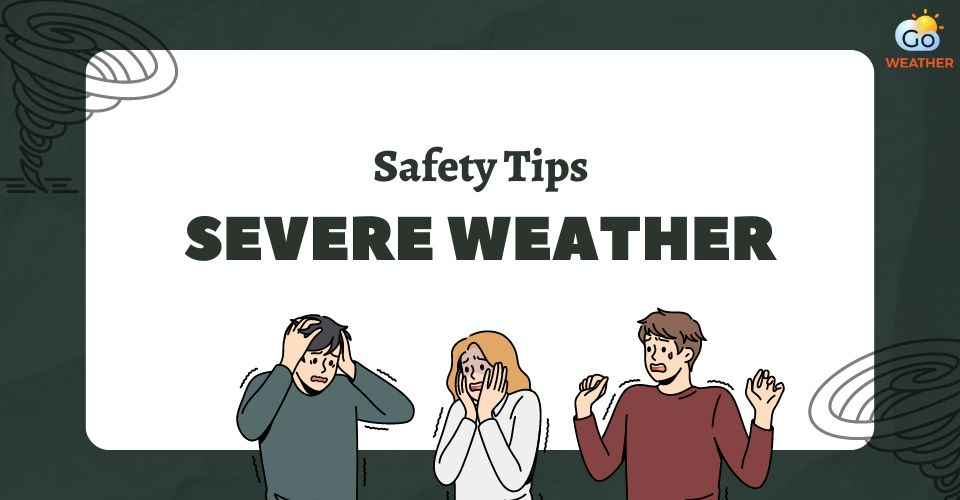Severe Weather Advice: Tips to Be Safe During Flooding, Storms & More
Extreme weather has significant impacts on people. Therefore, knowing severe weather advice is important so that people know which steps are needed to minimize those impacts and stay safe during these tough times. We can’t know exactly when these weather conditions happen and how dangerous they are, but we can get ourselves well repaired.
.jpg)
Tips to survive adverse weather conditions
What To Prepare
No matter what the adverse weather you will face, it is essential to take the following three steps to ensure you and your loved one are ready for emergencies.
Build a kit
Prepare a kit in case you need to evacuate or lose electricity. You should prepare an emergency kit that includes enough food, water, and other essential supplies to last at least three days for each family member.
Remember to bring any necessary medications, copies of key documents, and specific items for children and pets.
.jpg)
Prepare an emergency kit
Make a plan
An emergency plan should cover what to do if you become separated from your family during an emergency, as well as what to do if you must flee.
Be sure to coordinate your plan with your child's school, workplace, and community emergency plans.
Remember to include pets in your emergency plan as well.
It is critical to plan ahead of time to determine which pet-friendly hotels are available in your region and where your dogs may remain in the event of an emergency.
Be informed
You should know how local authorities will alert you during an emergency and how you will get information, such as local radio, TV, or other channels.
.jpg)
Forecast severe weather with useful apps
For the best convenience, you can check the weather forecasts right on your mobile phone using free weather apps, such as GoWeather. It is compatible with both iOS and Android operating systems.
For complete information and severe weather forecasts for wherever you are, visit GoWeather. You can find weather now, hourly, and 3 days, 5 days, 7 days weather forecasts at your fingertips.
Flood Safety
Floods, small or big, may devastate your home and family. Some floods develop gradually, whereas flash floods occur within minutes or hours of a storm or containment system failure.
So here are some tips to help you survive this disaster.
-
Preparing for a flood.
-
Switch off gas, electricity, and water.
-
Check your home insurance.
.jpg)
Severe weather guidelines in case of flooding
-
Get flood protection products like sandbags, floorboards, plastic covers, etc.
-
Draw the curtains and close windows to protect against wind.
-
Tell family or friends about the place that you’re going to stay in during the extreme weather.
-
Keep your car away from trees and high walls.
-
Have your pet kept by someone who is not at risk of flooding.
-
Install water-resistant hardwood flooring or tiles with waterproof adhesive if you live in a high-risk flood area.
Thunderstorm Safety
Thunderstorms are hazardous storms that include lightning. Lightning strikes can kill you.
They frequently bring strong winds that may knock down trees, mobile homes, and power lines. There is also heavy rainfall that creates flash floods, tornadoes, and lightning strikes that can start fires, as well as devastating hail.
But we can take steps to prepare. Prepare now to protect yourself, your family, and your house.
-
Keep your property in a well-maintained and safe place.
-
Fasten objects like ladders and garden furniture to save them from being blown around.
-
If you're planning to travel, remember to check with the ferry company or airline to see if there are any delays or cancellations.
.jpg)
Severe weather advice to stay safe during thunderstorms
-
Close doors and windows.
-
Keep vehicles clear of trees, walls, and fences.
-
Make sure to get prepared if there is a power cut.
-
Follow the instructions provided by public safety officers.
-
Do not go outside to repair damage during the storm.
-
Avoid driving if your journey is unnecessary.
-
After a storm, neither touch any electrical cables that have been still hanging nor walk too close to walls, buildings, and trees.
Tornado Safety
A tornado is a spinning tube of air that emerges from a thunderstorm and strikes the ground. It may knock down buildings, uproot trees, move cars, and destroy whatever is in its path. It is also possible to have heavy rain, lightning, flash floods, or hail.
So, prepare now to be safe.
.jpg)
Tornado safety tips
-
Locate a safe room built to withstand high winds.
-
Stay out of large open rooms like gyms and auditoriums.
-
Avoid using elevators.
-
Postpone outdoor activities.
-
Bring in or secure outdoor objects.
-
Do not open windows.
Power Outage Safety
A power outage happens when the electrical power fails. It can linger for days or longer, causing disruptions in communications, water, transportation, retail, banking, and other services.
Plan ahead of time for what you'll need and how to keep safe.
-
Avoid driving unless essential, as traffic lights will be out and roads may be crowded.
-
Turn off and unplug any equipment, appliances, and electronics.
.jpg)
How to stay safe during a power outage?
-
Keep freezer and refrigerator doors closed as much as possible to protect your food.
-
If the power outage lasts more than a day, prepare a cooler with ice for your freezer items.
-
Do not use an oven or gas stove to heat your home.
-
Keep away from power lines
Heat Safety
An extreme heat event is a sequence of hot days that are significantly hotter than typical for a certain period and location. Extreme heat is the deadliest meteorological phenomenon, killing more people than any other.
Check out severe weather advice below:
-
Never leave children or pets in your vehicle.
-
Stay in an air-conditioned place as much as possible.
.jpg)
Tips to deal with extremely hot weather
-
Watch out for summer season diseases.
-
Drink plenty of fluids to stay hydrated.
-
Eat healthy food and get enough sleep.
-
Wear lightweight, loose-fitting, and light-colored clothing.
-
Stay indoors and avoid strenuous workouts. (related: weather tips for workouts)
-
Replace minerals and salt with snacks or a sports drink.
-
Take frequent breaks if working outdoors.
-
Postpone outdoor activities and games.
Cold Weather Safety
Every winter, extremely cold air affects millions of people throughout the world. Arctic air may be harmful. When combined with vigorous gusts, dangerously low wind chill values can occur.
Here are some helpful severe weather tips you must be aware of:
-
Follow instructions from public safety officials.
-
Minimize outdoor activities for the whole family, including pets.
-
Know the symptoms of and watch out for winter season diseases.
.jpg)
Cold weather safety
-
Wear several layers of lightweight, loose-fitting clothing rather than a single heavy layer.
-
Check tire pressure, antifreeze levels, heater/defroster, etc.
Conclusion
We hand-pick severe weather advice that is certainly helpful for you. Remember, keep yourself updated with weather news and weather forecasts to know what to do next. Equipped yourself with these tips to stay safe during extreme weather days.










0 Comments
Leave a Comment
Your email address will not be published. Required fields are marked *